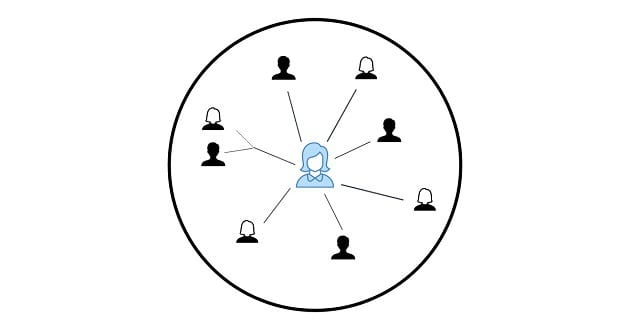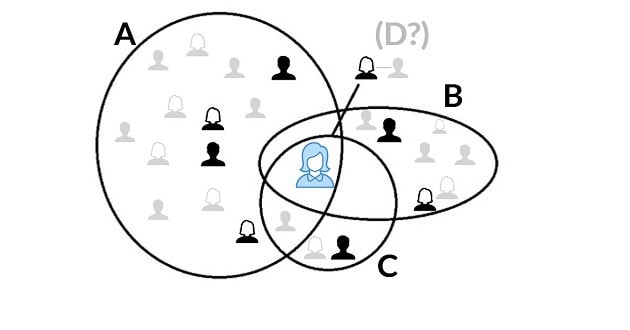This post may contain affiliate links and Corporette® may earn commissions for purchases made through links in this post. As an Amazon Associate, I earn from qualifying purchases.

This is kind of an abstract post, so I'll ask some questions up front for you to think about as you read over it — what are your best professional networking tips, particularly regarding how to build your network, and then how to maintain a network? Which networks, associations and affiliations have been the most fruitful and the most enjoyable for you? Have you seen a lot of overlap and “lucky coincidences” between your various networks, associations and affiliations?
I've been thinking about different business relationships you have to cultivate over the course of your career, from people in your network to mentors to sponsors and beyond. When I was younger, if you had asked me about “how to build your network,” I might have defined it as very self-focused. You choose who you want to bring into your orbit and keep them there — people who are handpicked for knowledge or skill or experience as it relates to you.
This version of “how to network” might be represented visually like this:

But I don't think that's quite right. At least, the older I get — the more entrenched I get in career #3 — and the more I read about professional networking tips, the more it seems like this above version is too isolationist. Instead, I find, it's easier to think of building your network as you finding and joining preexisting networks, where people know each other already and may come to know you as well (a note on that later).

How to Build Your Network
So – you can handpick which networks you join based on shared qualifications (alumni networks), subject matter (e.g., lawyers interested in X), shared experience/background (e.g., former colleagues of Firm Y). The picture below shows networks A, B, C, and what may become Network D — and the gray figures are all the potential connections within the network you can make.
(We've talked about what A, B, and C might look like in our posts on finding and joining professional organizations, as well as on our post on how to make new friends and network. Note that some networks that readers have felt enriched their lives and helped their networks, like The Junior League, aren't necessarily career-related.)
So if you attend a conference for Network A, then you can see all those people who you already know in that network — and meet more people as well.
I would also argue that you could make a small “ask” of anyone in Network A if the need arose: an informational interview, getting an actual name for someone hiring for the open job, even a quick 15-minute call. I think you could make an “ask” of any person in any of those circles, with bigger asks for people already connected to you. But a quick question, 15 minutes on the phone, an informational interview — these are things you can usually get with a simple “we both used to work at Firm Y.” (I went into a bit more detail in this on my post on how to network when you're junior.)
Up there by the gray D — maybe you only really know one person in a kind of isolationist relationship — and you know her well enough that she would be willing to make an introduction for you to someone else in her network. But that depends heavily on the relationship you have with that one woman — whereas it's going to be easier to meet people in networks A, B, and C.
How to Maintain Your Network
“Maintaining your network,” then, might look like some of these activities:
- joining a listserv or Facebook group for an alumni group, and attending parties or getting involved in the group
- attending a conference for your legal specialty
- having lunch with those individual people you know well, hosting a party of your own
Note that some of the people in Network C overlap with Network A — this can be handy when you're attending a huge conference or other event (alumni reunion for your university, for example), because you can suggest a smaller meetup of people in Network B who are attending Network A's conference. For example, in one of the mothers' groups that I'm on on Facebook I see this all the time; I've also seen it with some political groups. (This might be a good time to point you to our older posts on how to network at a conference.)
Another way this broader sense of networking might work: once you're in FB groups, attending events or parties, or even reading trade/niche publications (or even just articles shared among that network), you'll start to see names that repeat — the leaders, the connectors, within that network.
Make sure you can put a face with their name, and make sure to get to know those names well at the next event you go to. It's helpful to give yourself a networking “target” (in what is hopefully a non-creepy sense), and may lead to other connections or opportunities to assert yourself as a rising leader within your niche network. (It's also worth noting that if you're an introvert and have no interest in leading or connecting with people, you can still gain valuable information from the articles shared among that network — see career trends — even hear about job openings and more.)
What are your best professional networking tips, ladies — particularly as it comes to growing and building a network? Which networks have been the most fruitful, the most enjoyable, the most “level changing”? What do you think networking looks like as you get further in your career? What tricks have you used to expand your network? What do you think are appropriate “asks” to members in your network? And what are your best hacks for maintaining your network?

Graphics (c) Katfry LLC via Stencil. Social media image credit (shaking hands): Stencil.

CPA Lady
Honestly, working in a high turnover industry in a small-ish city, staying friendly with former coworkers, bosses and mentors has been the biggest thing for me. I now know multiple people who work at pretty much anywhere I would want to work in town who would be willing to put in a good word for me. A lot of time “networking” with these folks just looks like going out to lunch regularly or making a point to say hi and catch up at continuing education events. I also joined jr. league and have met a lot of professional woman that way. I used to think networking was this big intimidating Thing or weirdly artificial. All those recommendations to send people industry articles and stuff like that just seems weird and fake to me, so I don’t do it that way. For me, it is about building and maintaining professional friendships.
NYNY
Just last week, I gave this advice to a departing employee: “Continue to meet your former colleagues and bosses for drinks. It’s how you know what’s going on, and it’s where you’ll get your next job.” He laughed and asked if that was all networking was, and I said pretty much.
Leah
Offer help/resources/references to outgoing interns/students/studyships. Check in and keep up on their journeys. Not only will you be paying it forward, but understanding their trajectories can help you mold your own direction as well.
Frustrated Would-be Networker
It drives me nuts that about 80% of the time I attempt to network with a man – of any age, of any marital status – it gets interpreted as me being romantically interested. Am I doing it wrong or does everyone have this problem?
AnonTechie
Sadly, it is common. Some things that help-
1. Meet during the day
2. Behave like you would with a friendly colleague- be comfortable, enjoy but don’t get nervous.
(Context- for me, and a lot of friends, nervous tells are very similar to other girly/flirty behaviors such as playing with hair/ jewelry/clothes or grinning stupidly)
Beyond that, if people want to make assumptions, eh! If the person you are meeting makes assumptions, pull the conversation back to fun business topics- new technology, new regulation, cool research in the space, whatever conferences are trending etc. If they are still obtuse, they are probably not good “network” material
Houda
I might be told off for saying this and I’m sure there is a more sensible PC way of saying it but I think it’s mostly because nowadays men are too wary of #metoo threats. There is always a slight risk that a 1 on 1 professional encounter with a woman could start a rumor, be misinterpreted, eventually used to tarnish one’s reputation. It only takes an allegation to kill your career, regardless of whether it was founded or not, whether you got acquitted or not.
As a 56 year old man, why would I even go there? I can always mentor countless male juniors and no eyebrow would be raised and I don’t have to thread carefully. A woman is too much work.
Agree
I completely agree that there are downsides to the #metoo movement. My husband is 55 years old and wonders out loud, “Who in the world would any man now hire a woman if a qualified male candidate exists?” I will probably be told off for saying this (in your words) but I have personally known a female coworker who made a poor decision in the work place and tried to blame it on date rape drug. “I did not drink that much. Someone must have given me a date rape drug.” Umm, no I was there and watched you willingly consume four margaritas and a half bottle of wine before sleeping with your peer.
RJ
because it’s the right thing to do – in most fields there are few senior women, and if junior women get no mentoring, we don’t advance. If you have nothing to hide you have nothing to hide. In my field (subfield of academia), the sketchy dudes are known elements. My best mentor is a man, who I have met in hotel rooms for coffee. If people want to talk, I guess they will, but he is impeccable personally and professionally.